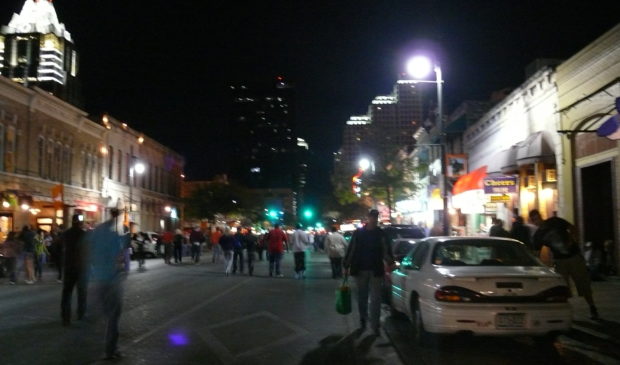Music Commission seeks answers on lingering sound enforcement, ‘agent of change’ issues
Monday, February 10, 2020 by
Chad Swiatecki The Music Commission has asked representatives from the Austin Police Department to attend its next meeting to discuss the delay in moving sound enforcement responsibilities from the police department to the city’s music office.
At last week’s meeting, Rebecca Reynolds, president of the local Music Venue Alliance, said she has been looking into “a little bit of a delay” in the switch. Having dedicated sound staff in the Entertainment Services division take over sound enforcement from the police department was one of several recommendations stemming from the city’s latest attempt last year to pass an “agent of change” policy governing sound issues between music venues and nearby residences or hotels.
After Reynolds’ update, Commissioner Doug Leveton shared the details of a series of noise violation tickets given to bars and music venues on Rainey Street last month, though no complaints were recorded by the city and no noise monitor readings were taken. Leveton, who helps to book music at the Half Step bar, said businesses in the Rainey Street district began seeing increased sound enforcement last spring, shortly after the 70 Rainey condominium development opened.
“We thought we were operating within the laws of the sound ordinance, and it turns out enforcement can come out at any time and it doesn’t matter if you’re operating within the realm of the law,” he said. “They will ticket you first and ask questions later. I believe we’re in a new era – that sound, even if at an appropriate level, is seen as a nuisance and what we thought was complaint-based is turning into APD taking their own initiative and enforcing without complaints.”
Along with asking for a police representative at the March meeting, the commission asked music division staff to present an update on progress in implementing the recommendations attached to the agent of change issue.
Erica Shamaly, director of the music division, said sound enforcement is one component of the agent of change concept, which has been in various stages of discussion and study for nearly six years.
Reynolds said her organization is working on broader planning and development concerns related to agent of change and music venues, including getting a specific definition of a live music venue included in the city’s evolving Land Development Code. She said that definition would make it possible for City Council to create land use considerations and possible incentives to encourage their growth of music venues without opening the door for less desirable bars and nightclubs in many parts of the city.
Reynolds said in discussions thus far, individual Council members haven’t objected to the definition, but neighborhood interest groups have expressed concerns.
“We’ve had this conversation with every Council office, and the language itself as far as the definition isn’t what seems to be problematic. There are some districts who have very active neighborhoods who are concerned that if we elevate music venues and provide for more music venues that they’re going to have one in their backyard,” she said.
“Whether that’s realistic or whether or not that’s even in the new rewrite, that’s a concern, and what I’m more afraid of is that even if that’s not being suggested, it’s being used as a tool to frighten people about any kind of revision to the Land Development Code. The idea that we are making a place for music has been politicized.”
Commissioner Graham Reynolds said years of fruitless brokering between music and development stakeholders make him hesitant to think there will be a quick or definitive conclusion to the agent of change process.
“It’s been negotiated for the last six years or so and it’s been very difficult because everyone can agree in principle. Not only does it protect the venues with residential encroaching, but it works vice versa, and if you have a quiet neighborhood and a loud music venue moves in, they’re the ones responsible for sound protection,” he said. “Everyone on the surface can say that’s great and makes a lot of sense, but for the entire six years the process of negotiation has started several times and getting down to the details of how that looks in reality has failed each time.”
Photo by Alexandra Cárdenas made available through a Creative Commons license.
The Austin Monitor’s work is made possible by donations from the community. Though our reporting covers donors from time to time, we are careful to keep business and editorial efforts separate while maintaining transparency. A complete list of donors is available here, and our code of ethics is explained here.
You're a community leader
And we’re honored you look to us for serious, in-depth news. You know a strong community needs local and dedicated watchdog reporting. We’re here for you and that won’t change. Now will you take the powerful next step and support our nonprofit news organization?









